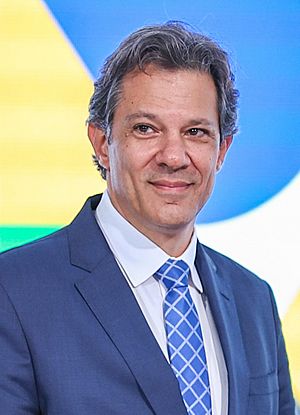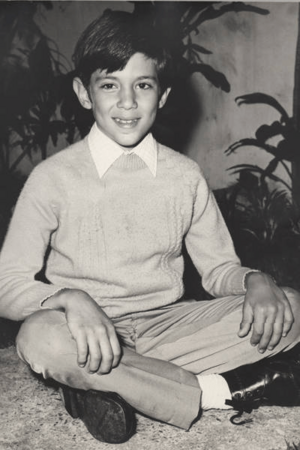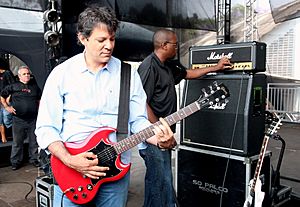Fernando Haddad facts for kids
Quick facts for kids
Fernando Haddad
|
|
|---|---|

Haddad in 2023
|
|
| Minister of Finance | |
| Assumed office 1 January 2023 |
|
| President | Luiz Inácio Lula da Silva |
| Preceded by | Paulo Guedes |
| Mayor of São Paulo | |
| In office 1 January 2013 – 1 January 2017 |
|
| Vice Mayor | Nádia Campeão |
| Preceded by | Gilberto Kassab |
| Succeeded by | João Doria |
| Minister of Education | |
| In office 29 July 2005 – 24 January 2012 |
|
| President | |
| Preceded by | Tarso Genro |
| Succeeded by | Aloizio Mercadante |
| Personal details | |
| Born | 25 January 1963 São Paulo, São Paulo, Brazil |
| Political party | PT (1983–present) |
| Spouse |
Ana Estela Haddad
(m. 1988) |
| Children | 2 |
| Alma mater | University of São Paulo (LL.B., M.Ec, Ph.D.) |
Fernando Haddad (born 25 January 1963) is a Brazilian scholar, lawyer, and politician. He has been Brazil's Minister of Finance since January 1, 2023. Before this, he was the mayor of São Paulo from 2013 to 2017. He also served as the Brazilian Minister of Education from 2005 to 2012.
Haddad is a professor of political science at the University of São Paulo (USP). He studied law, economics, and philosophy at this university. He also worked as an investment analyst. From 2001 to 2003, he worked for the Finance and Economic Development department in São Paulo.
He also worked in the Ministry of Planning from 2003 to 2004. During this time, he helped create a law for public-private partnerships in Brazil.
Contents
Fernando Haddad's Early Life and Education
Fernando Haddad was born in São Paulo, Brazil. He is the second of three children. His father, Khalil Haddad, came to Brazil from Lebanon in 1948. His mother, Norma Teresa Goussain, was born in São Paulo to a Lebanese family.
Haddad went to high school at Colégio Bandeirantes. In 1981, he started studying law at the Law School, University of São Paulo. He earned degrees in law, economics, and philosophy from the University of São Paulo. He has a master's degree in economics and a doctorate in philosophy.
Haddad started his career as an investment analyst. However, he has spent most of his career working in public service. He has been a consultant for an economics research institute. He also worked as a special advisor for the Ministry of Planning.
Today, Haddad is a professor in the political science department at the University of São Paulo.
Fernando Haddad's Political Career
Becoming the Minister of Education
Haddad became the Minister of Education on July 29, 2005. He took over from Tarso Genro. In 2007, Haddad created the Basic Education Development Index (IDEB). This index helps measure the quality of public primary and middle schools.
During his time as minister, the government started the University for Everyone Program (ProUni). This program offers scholarships for students from low-income families to attend private universities. The Ministry also changed the National High School Exam (ENEM). These changes helped more students use the exam for university admissions.
Serving as Mayor of São Paulo
In 2012, Haddad ran for Mayor of São Paulo. He won the election in the second round. He beat José Serra with 55.57% of the votes. As mayor, Haddad worked to expand the city's network of bike lanes. He planned to increase them from 64.7 km to 400 km by 2016. This project caused different reactions among the city's residents.
In June 2013, his government faced large protests. This happened when São Paulo city hall and the state government raised bus fares. The way these protests were handled by the police led to a bigger public reaction. These events became known as the 2013 protests.
In July 2016, only 14% of city residents approved of Haddad's work. This was the lowest approval for a mayor at the end of their term since 2000. On October 2, 2016, Haddad lost his re-election bid. He received only 17% of the votes. He left office on January 1, 2017.
In 2022, Haddad ran for governor of São Paulo. He lost this election in the second round.
Becoming the Minister of Finance
After his election loss in São Paulo, Haddad was chosen as the Minister of Finance. He was appointed by President Luiz Inácio Lula da Silva. This appointment followed Lula's victory in the 2022 presidential election.
New Financial Rules
The government needed to create new financial rules for the country. Haddad presented a proposal to the National Congress. This proposal was accepted on August 22, 2023. The new law set limits on how much government spending could grow each year. It also made sure that investments would keep up with inflation.
The new rules aim to eliminate the government's primary deficit by 2024. They also hope to achieve surpluses in 2025 and 2026.
"Desenrola Brasil" Program
In July 2023, Haddad launched the "Desenrola Brasil" program. This program helps people renegotiate their debts. It was divided into two phases. The second phase, launched in October 2023, helped renegotiate non-bank debts.
The program aims to reduce debt among people, especially those with lower and middle incomes. It also makes it easier for people to get credit.
Tax Reform
A major tax reform was approved in Brazil in December 2023. This was the first time such a reform happened in over 30 years. One main point of the reform is that basic food products are now exempt from taxes. It also created a new Value Added Tax (VAT) and a "selective tax." The "selective tax" is on items that are considered harmful, like some unhealthy products.
Medicines, vegetables, and medical devices are also exempt from VAT. Other products, like speedboats and yachts, now have new taxes. The reform also changed how inheritance taxes work. The National Congress approved the reform on December 20, 2023. Leaders from the government, parliament, and courts attended the ceremony.
After the reform was approved, a credit rating agency called S&P Global Ratings improved Brazil's credit rating. They noted "better prospects for economic growth."
Minimum Wage and Income Tax Changes
In February 2023, the minimum wage was increased. In December 2023, it was increased again to 1,412 reals, effective January 1, 2024. These increases are part of a new plan to adjust the minimum wage above inflation every year. This helps people keep up with rising prices for basic goods.
Also, in early 2023, the amount of income that is exempt from income tax increased. In February 2024, this exemption was raised again. Now, people who earn up to 2,824 reais per month do not have to pay income tax.
Inflation Target Changes
Haddad supported setting the inflation target at 3% each year. He also believed the target should be measured continuously over 12 months. After discussions, President Lula signed a decree for a continuous inflation target starting in 2025. This means the target will be pursued throughout the year, not just for a calendar year.
The National Monetary Council (CMN) confirmed the 3% goal. This new system gives the government more flexibility. It allows for a longer-term approach to managing prices. If inflation goes off target for six months, the central bank must explain why and what steps they will take. The central bank will also publish a quarterly report on monetary policy.
2018 Presidential Election
Haddad was chosen as the running mate for Luiz Inácio Lula da Silva in the 2018 presidential election. However, Lula could not run for president. So, on September 11, 2018, Haddad became the Workers' Party candidate for president. Manuela d'Ávila became his vice presidential candidate.
Haddad came in second place in the first round of the election. He received 29% of the votes. He then faced Jair Bolsonaro in the second round on October 28, 2018. Haddad lost the election, getting 44.87% of the votes.
Other Activities
- World Bank, a member of the board of governors (since 2023)
Personal Life
Fernando Haddad belongs to the Greek Orthodox Church of Antioch.
During his time as mayor of São Paulo, some people nicknamed him "Jaiminho." This is a reference to a character from a popular Mexican TV show.
Haddad enjoys playing the guitar as a hobby. He is sometimes seen in public with his SG Gibson guitar.
Electoral History
| Election | Party | Office | Coalition | Running mate | First round | Second round | Result | ||
|---|---|---|---|---|---|---|---|---|---|
| Votes | % | Votes | % | ||||||
| 2012 São Paulo mayoral election | Worker's Party (PT) | Mayor | To Change and Renovate São Paulo
(PT, PCdoB, PP, PSB) |
Nádia Campeão
(PCdoB) |
1,776,317 | 28.98
(#2) |
3,387,720 | 55.57
(#1) |
Elected |
| 2016 São Paulo mayoral election | Mayor | More São Paulo
(PT, PCdoB, PR, PDT, PROS) |
Gabriel Chalita
(PDT) |
967,190 | 16.70
(#2) |
- | - | Lost |
|
| 2018 Brazilian presidential election | President | The People Happy Again
(PT, PROS, PCdoB) |
Manuela d'Ávila
(PCdoB) |
31,342,051 | 29.28
(#2) |
47,040,906 | 44.87
(#2) |
Lost |
|
| 2022 São Paulo gubernatorial election | Governor | Together for São Paulo
(PT, PCdoB, PV, PSOL, Rede, PSB, Agir) |
Lúcia França
(PSB) |
8,337,139 | 35.70
(#2) |
10,908,972 | 44.73
(#2) |
Lost |
|
See also
 In Spanish: Fernando Haddad para niños
In Spanish: Fernando Haddad para niños



